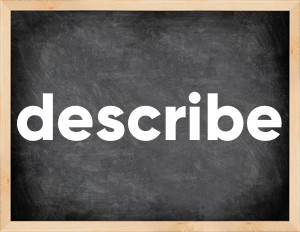 The English verb 'describe' is pronounced as [dɪˈskraɪb].
The English verb 'describe' is pronounced as [dɪˈskraɪb].
Related to:
regular verbs.
3 forms of verb describe: Infinitive (describe), Past Simple - (described), Past Participle - (described).
Here are the past tense forms of the verb describe
👉 Forms of verb describe in future and past simple and past participle.
❓ What is the past tense of describe.
Describe: Past, Present, and Participle Forms
| Base Form | Past Simple | Past Participle |
|---|---|---|
| describe [dɪˈskraɪb] |
described [dɪˈskraɪbd] |
described [dɪˈskraɪbd] |
What are the 2nd and 3rd forms of the verb describe?
🎓 What are the past simple, future simple, present perfect, past perfect, and future perfect forms of the base form (infinitive) 'describe'?
Learn the three forms of the English verb 'describe'
- the first form (V1) is 'describe' used in present simple and future simple tenses.
- the second form (V2) is 'described' used in past simple tense.
- the third form (V3) is 'described' used in present perfect and past perfect tenses.
What are the past tense and past participle of describe?
The past tense and past participle of describe are: describe in past simple is described, and past participle is described.
What is the past tense of describe?
The past tense of the verb "describe" is "described", and the past participle is "described".
Verb Tenses
Past simple — describe in past simple described
(V2).
Future simple — describe in future simple is describe (will + V1).
Present Perfect — describe in present perfect tense is
described
(have/has + V3).
Past Perfect — describe in past perfect tense is
described
(had + V3).
describe regular or irregular verb?
👉 Is 'describe' a regular or irregular verb? The verb 'describe' is regular verb.
Examples of Verb describe in Sentences
- I got this weird feeling that is hard to describe (Past Simple)
- Would you describe yourself as an optimistic person?
- I have heard it described as one of the finest houses in Hampshire (Present Perfect)
- Intimidating and tough might be the best words to describe him (Present Simple)
- Anyone who has met her would not describe her as friendly
- Do you understand these rights as I have described them to you? (Present Simple)
- Can you describe your state of mind leading up to the crime? (Present Simple)
- I don’t think that’s quite the word to describe my feelings (Present Simple)
- Can you describe the task to the class? (Present Simple)
- Your actions describe your education (Present Simple)